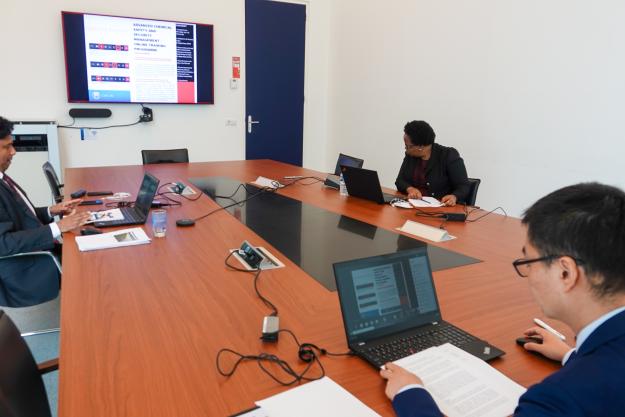
THE HAGUE, Netherlands — 13 August 2020 — The Organisation for the Prohibition of Chemical Weapons (OPCW) organised an online training course on 12 August on chemical safety and security management for African Member States. The course focused on promoting and disseminating chemical safety and security management culture, through the sharing of policies and best practices among national stakeholders to enhance capacities and improve cooperation.
OPCW’s Head of the International Cooperation Branch, Mr Li Zhao, remarked: “The OPCW will continue to deliver capacity building initiatives to meet the increasing demand for safety and security training in a context of rapidly expanding and increasingly complex chemical industries as well as evolving developments in science and technology.”
The training course was comprised of online lectures delivered by OPCW Technical Secretariat staff. Participants shared their views on new approaches related to various aspects of chemical safety and security, as well as methods to evaluate chemical safety and security performance in chemical processes. Resources, tools and further training were also identified to promote and disseminate safety standards in the region. The training course ended with a virtual exercise, during which participants put their newly acquired knowledge into practice.
The course was attended by forty-two participants representing National Authorities, chemical industry, industry associations, government departments, and academics from twenty Member States: Kenya, Mali, Mauritania, Mauritius, Niger, Nigeria, South Africa, Sudan, Togo, Tunisia, Uganda and Zimbabwe. Coordinators from CRDF Global also attended as observers.

Background
General training courses assist Member States in complying with their obligations under the Chemical Weapons Convention by enhancing knowledge and skills in national implementation.
As the implementing body for the Chemical Weapons Convention, the OPCW, with its 193 Member States oversees the global endeavour to permanently eliminate chemical weapons. Since the Convention’s entry into force in 1997, it is the most successful disarmament treaty eliminating an entire class of weapons of mass destruction.
Over 98% of all chemical weapon stockpiles declared by possessor States have been destroyed under OPCW verification. For its extensive efforts in eliminating chemical weapons, the OPCW received the 2013 Nobel Peace Prize.
